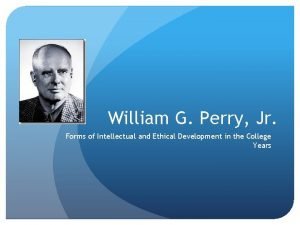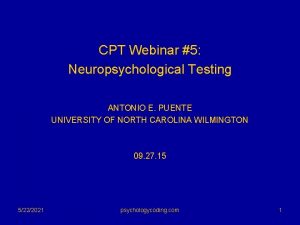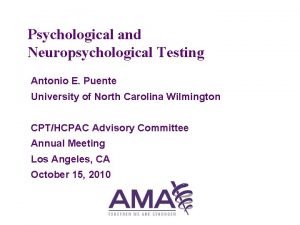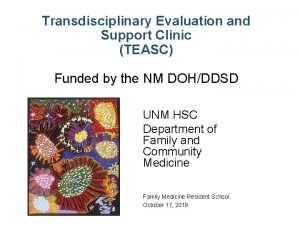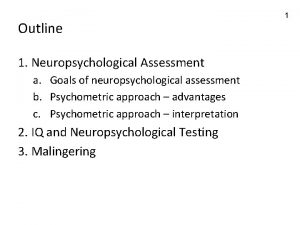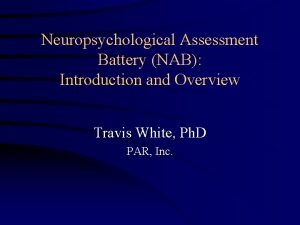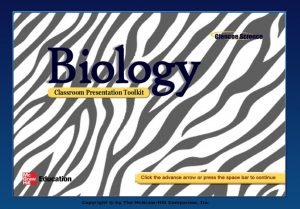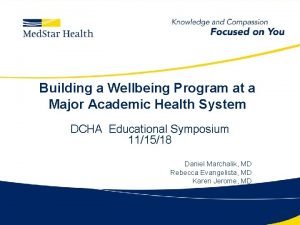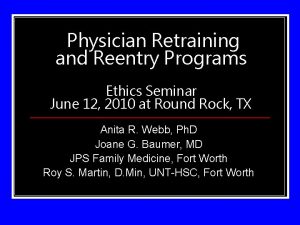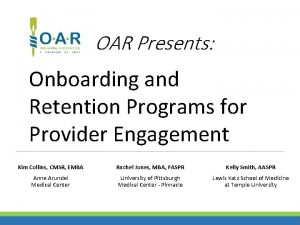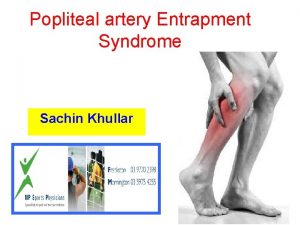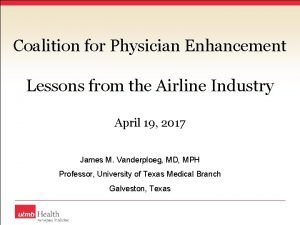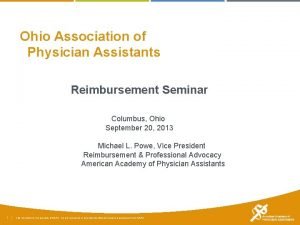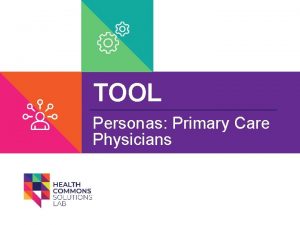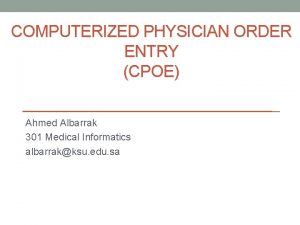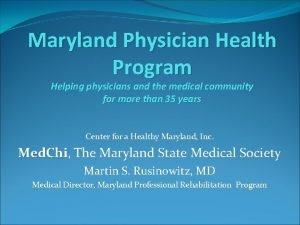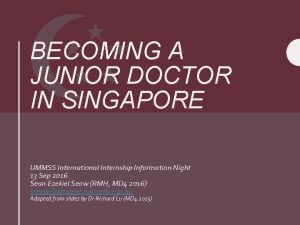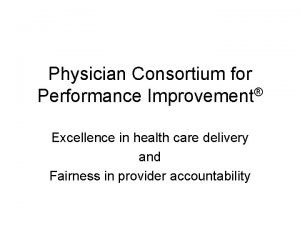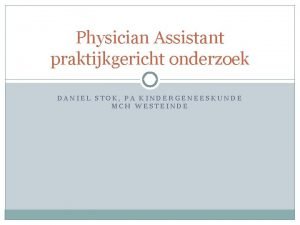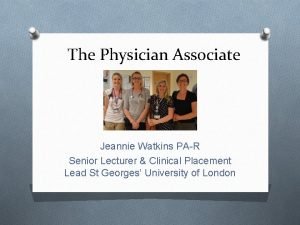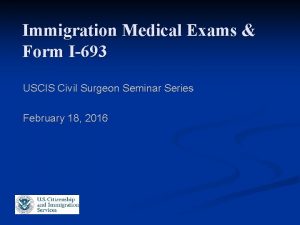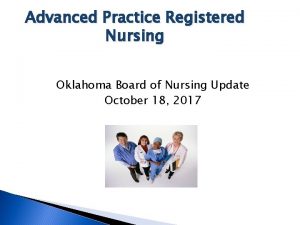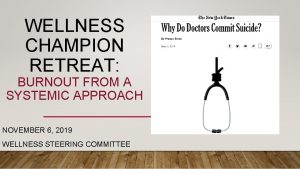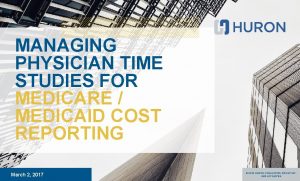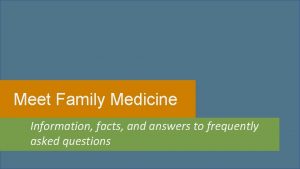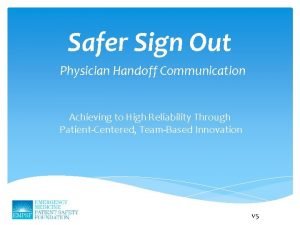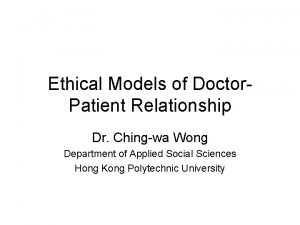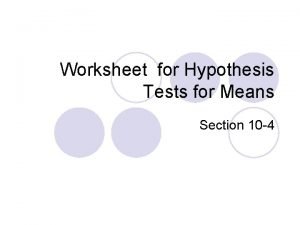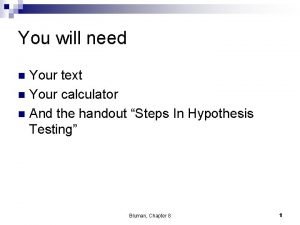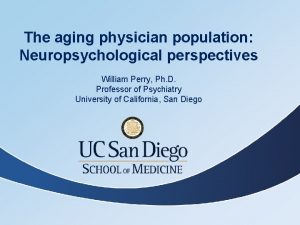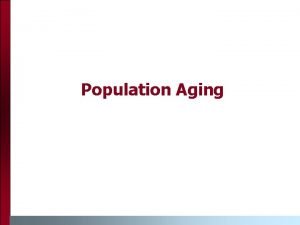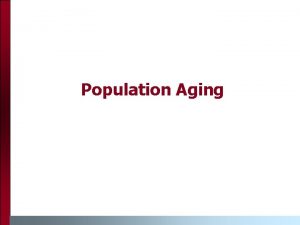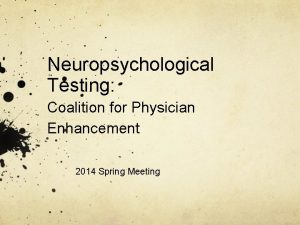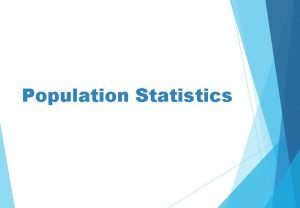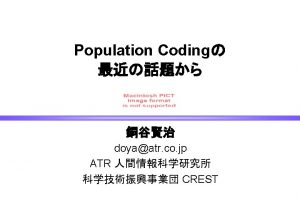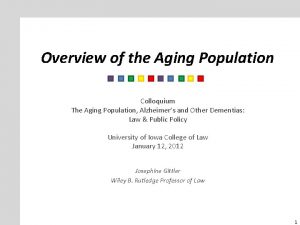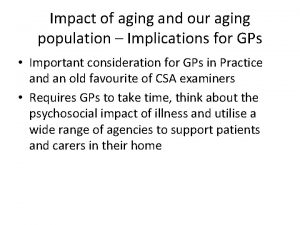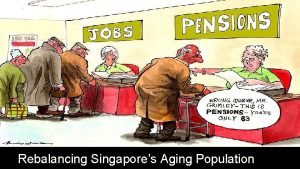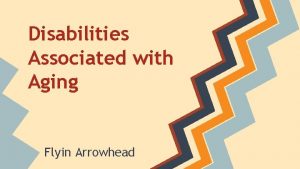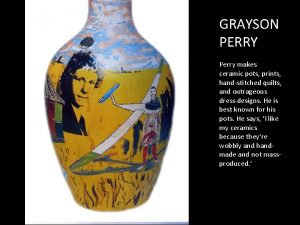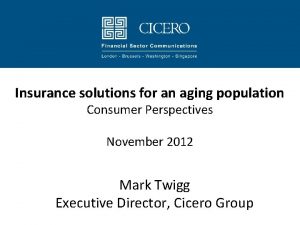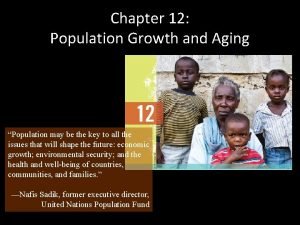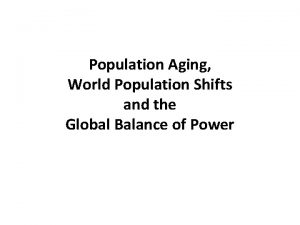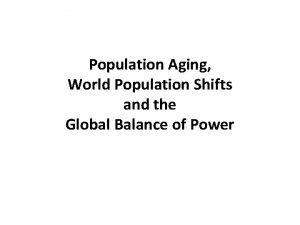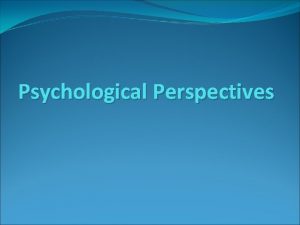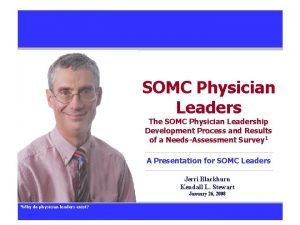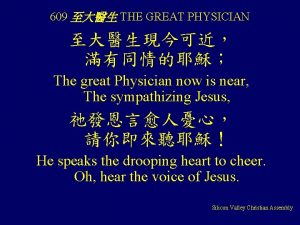The aging physician population Neuropsychological perspectives William Perry



































- Slides: 35

The aging physician population: Neuropsychological perspectives William Perry, Ph. D. Professor of Psychiatry University of California, San Diego

Conventional wisdom about physician expertise generally holds that the longer a physician has been in practice, the better honed his or her clinical skills become

The aging physician population • Hobus et al. (1987) presented physicians with short case histories consisting of a patient's picture, previous disease history, and presenting complaint. • A strong positive correlation between experience and diagnostic accuracy (r =. 68). • Their initial hypotheses however was correct only 38% of the time and they used contextual information drawing from experience.

The aging physician population: Ageism?

What are the concerns? • Hartz and colleagues (1999) examined operative mortality among 275 surgeons performing coronary artery bypass grafting. They found that mortality rates increased with years of experience. • Older physicians are less likely to incorporate new treatment strategies into their practice and less likely to prescribe appropriate medications. Stolley, Becker, Lasagna, et al. Med Care. 1972; 10: 17– 28 Rhee. Med Care. 1976; 14: 733– 750

What are the concerns ? Older physicians have poorer performance on recertification examinations and are less likely to have a current knowledge base. Ramsey PG, Carline JD, Inui TS, et al. JAMA. 1991; 266: 1103– 1107

Systematic Review: The Relationship between Clinical Experience and Quality of Health Care Choudry, Fletcher & Soumerai Ann Intern Med. 2005; 142: 260 -273 Of 62 published studies that measured physician knowledge or quality of care and described time since medical school graduation or age, more than half suggested that physician performance declined over time for all outcomes measured. Only 1 study showed improved performance for all outcomes measured.

Why assess Neuropsychological/ cognitive abilities?

Physicians are among those special groups who operate in an environment unforgiving of human error, where cognitive failure can lead to catastrophic consequences.

Why assess cognitive abilities? • Turnbull PREP Program in Canada assessed “impaired” physicians before and after remediation and found that failure to remediate was associated with cognitive problems. • Turnbull study demonstrates that neuropsychological testing can identify physicians who are less likely to improve with remediation.

Percentage of PACE physicians that scored 1 SD below the mean (Perry & Crean, 2005) Test WAIS –R Picture Arrangement CVLT list learning trials 1 -5 Category Test errors Trail Making Test-Part A Numerical Attention Test Symbol-digit modality Complex figure learning % mean 25 25 30 29 42 22 30

Does age effect competence?

The Aging Brain Facts of aging: • Cardiovascular changes (hypertension) • Renal changes (strong relationship BMI, diabetes and Memory) • • • Pulmonary changes Urogenital changes Decreased visual acuity Decreased physical strength and stamina Often decreased hearing

The Aging Brain Facts of aging on cognition: • Decreased reaction time • Decreased fine motor skills/ dexterity • Difficulty learning new concepts and skills • Decreased comprehension of complex information • Decreased analytic processing • Decrease attention to novel details

Understanding the cognitionperformance link in older physicians

Crystalized vs. Fluid Knowledge • Crystalized knowledge involves accumulated knowledge and expertise and relies on long term memory…habitual procedures. • Fluid knowledge involves novel problem solving, spatial manipulation, mental speed, and identifying complex relations among stimulus patterns.

Crystalized Abilities Crystalized abilities increase during the lifespan through education, occupational and cultural experience and exposure to culture and intellectual pursuits. Crystalized abilities are less affected by aging and disease and often remain intact in the early stages of dementia or after brain injury.

Fluid Abilities The developmental trajectory of fluid abilities follow neurological maturation, peaking in the mid 20 s and declining gradually until the 60 s when a more steep decline takes place. Fluid abilities are affected by neurological insult, genetics and biological aging processes.

The Aging Physician and Changes in Cognitive Processing and Their Impact on Medical Practice Eva & Barnes (2002) Acad Med, 77: S 1 -S • Analytic processing tend to decline with age whereas nonanalytic processing remains stable. • Older physicians tend to do less well when dealing with novel, conflicting, and complex patient situations. • The more individuals rely on their prior experience, the less of a tendency there will be to critically assess novel conflicting information.

The role of neuropsychology in assessing the aging physician

Goals of a Neuropsychological (diagnostic) /Fitness for Duty Evaluation • To screen for covert disease and diagnose a neuropsychological/neurological condition (Dementia, Mild Cognitive Impairment, Significant Attentional Disorder). • To determine if a primary health condition (cardiovascular /pulmonary/ hepatic and renal changes) is impacting his/her cognitive functioning. • To address disease issues we rely on agerelated comparisons.

Goals of a Neuropsychological/Fitness for Duty Evaluation • To assess the physical, cognitive and emotional capacity to independently perform essential functions competently and in a manner that does not threaten the safety and health of patients. • Link cognitive abilities to function. • To address functionality we rely less on age and more on minimum standard of acceptable functioning. • Self and other report is often not useful.

Fitness for Duty Evaluation: The Federation of State Medical Boards Committee on Evaluation of Quality of Care and Maintenance of Competence • Identify dyscompetence as a “failure to maintain acceptable standards in one or more areas of professional practice. ” • Performance demands differ depending upon whether the physician engages in surgery (skillbased) or primary care (knowledge-based). • Specialty Board exams test knowledge not performance.

Things to consider: Accurate assessment of older physicians’ competence may be hampered by several factors • Older physicians may have a lower case load and therefore less opportunity for peer review. • Younger physicians may feel uncomfortable voicing concerns about older colleagues out of respect, or because the older physician may have been their mentor. • Detecting subtle cognitive impairment of an older physician is often difficult given their above-average premorbid functioning. Furthermore cut-offs used to determine dementia are too low resulting in increased false-negatives.

Things to consider: Accurate assessment of older physicians’ competence may be hampered by several factors (cont) • Physicians in solo practice or in rural communities may escape scrutiny by peers. • Hospitals may be more lenient because of difficulty replacing physician staff. • Hospitals may be reluctant to attend to warning signs because of revenue the physician generates.

What Neuropsychological Assessment Battery to use. Computerized Batteries (heavily weighted on attention and reaction time) Microcog, Cogscreen, CANTAB Comprehensive assessment of cognition (paper and pencil and computerized tests) Physician Review Program (PREP) assessment: WAIS, WMS, CVLT, Trail Making Test, WCST, Verbal Fluency tests, Stroop, PASAT, Rey-O

Neuropsychological Domains and its Relationship to Medical Practice Neuropsychological Function Premorbid intelligence and reading skills Medical Practice • Indication of a decline in function over time. • The ability to profit from continuing education. • The ability to understand communicate in English

Neuropsychological Domains and its Relationship to Medical Practice Neuropsychological Function Attention Medical Practice • The ability to attend and determine what is critical and salient. • To sustain auditory and visual attention over a sustained period of time. • The ability to inhibit impulsive and incorrect responses

Neuropsychological Domains and its Relationship to Medical Practice Neuropsychological Function Learning and Memory Medical Practice • The ability to learn and integrate new information as well as draw from past experience. • The ability to recognize and recall information efficiently and quickly, without irrelevant information impeding.

Neuropsychological Domains and its Relationship to Medical Practice Neuropsychological Function Perceptual-motor skills Medical Practice • The ability to perform physical tasks. • Eye-hand coordination. • The ability to manipulate instruments with accuracy.

Neuropsychological Domains and its Relationship to Medical Practice Neuropsychological Function Executive Function Skills Medical Practice • Recognize the significance of unexpected situations in order to quickly make alternative plans when unusual events arise. • Planning or decision making abilities. • Error correction or troubleshooting.

Summary: • Reviewed literature that suggests that aging induces cognitive changes and that these changes impact physician practice. • We linked cognition to performance : Older physicians draw from prior instances and rely more heavily on nonanalytic processes in their clinical practice.

Summary: continued • The role of neuropsychology in assessing the aging physician. • Explained the difference between a neuropsychodiagnostic assessment and a Fitness for Duty evaluation.

Next Step: remediation of deficiencies in medical practice “Doctors can accommodate cognitive decline by choosing to cease procedural work, allocating more time to each patient, using memory aids, seeking advice from trusted colleagues, and seeking second opinions. ” – Adler RG, Constantinou C. (2008). Knowing - or not knowing - when to stop: cognitive decline in ageing doctors. Med J Aust. 1 -15; 189(11 -12): 622 -4 With growing research we can begin to identify specific strategies for the continuing education of older physicians.

Thank you
 William g perry
William g perry Cpt 96119
Cpt 96119 Neuropsychological testing examples
Neuropsychological testing examples Teasc
Teasc Neuropsychological evaluation example
Neuropsychological evaluation example Neuropsychological assessment battery
Neuropsychological assessment battery Population ecology section 1 population dynamics
Population ecology section 1 population dynamics Population ecology chapter 4 answers
Population ecology chapter 4 answers Chapter 4 population ecology worksheet answer key
Chapter 4 population ecology worksheet answer key Section 1 population dynamics
Section 1 population dynamics Physician wellness academic consortium
Physician wellness academic consortium Physician reentry program
Physician reentry program Provider engagement
Provider engagement Popliteal artery
Popliteal artery Coalition for physician enhancement
Coalition for physician enhancement Pricewaterhouse
Pricewaterhouse Physician personas
Physician personas Disadvantages of cpoe
Disadvantages of cpoe Maryland physician health program
Maryland physician health program Mohh mopex
Mohh mopex Physician consortium for performance improvement
Physician consortium for performance improvement The good physician treats the disease
The good physician treats the disease Physician assistant kindergeneeskunde
Physician assistant kindergeneeskunde Jeannie watkins
Jeannie watkins Pa ieb physician certification form
Pa ieb physician certification form Designated civil surgeon locator
Designated civil surgeon locator Oklahoma board of nursing
Oklahoma board of nursing Physician burnout retreat
Physician burnout retreat Physician time study
Physician time study Wellstar physicians
Wellstar physicians Family physician facts
Family physician facts Physician sign out
Physician sign out Cphp mission statement
Cphp mission statement Relationship to patient example
Relationship to patient example A physician claims that joggers maximum volume
A physician claims that joggers maximum volume A physician claims that joggers maximum volume
A physician claims that joggers maximum volume
